Did you know 3 out of 4 adults in the U.S. struggle to manage their high blood pressure, despite relying on prescription drugs? Only 25% of hypertension patients achieve control. This shows a big problem in how we handle heart health.
Pills like ACE inhibitors and beta-blockers have been the main choice for years. But what if these treatments aren’t as good—or safe—as we’ve been told? The pharmaceutical industry makes $28 billion a year from heart drugs. Yet, millions still face strokes, kidney damage, and weird side effects.
You might not know about the hidden trade-offs of long-term medication use. Diuretics can take away important nutrients. Calcium channel blockers might even make heart failure worse in some cases. And, research shows lifestyle changes often work better for mild hypertension. But doctors rarely suggest this first.
Key Takeaways
- 75% of U.S. adults fail to control hypertension despite medication use
- Common prescriptions carry underreported risks like nutrient deficiencies
- Pharmaceutical companies prioritize profits over sustainable solutions
- Diet and exercise rival drug effectiveness for early-stage cases
- Regular monitoring helps identify safer alternatives to pills
This isn’t about giving up on modern medicine. It’s about understanding why we keep relying on pills when better choices exist. And how to break free. Keep reading to find out how to put your health first, not corporate interests.
Why Blood Pressure Drugs Dominate American Medicine
Did you know nearly half of American adults need high blood pressure treatment? This isn’t a random event. It’s because systems focus more on pills than on preventing the problem.
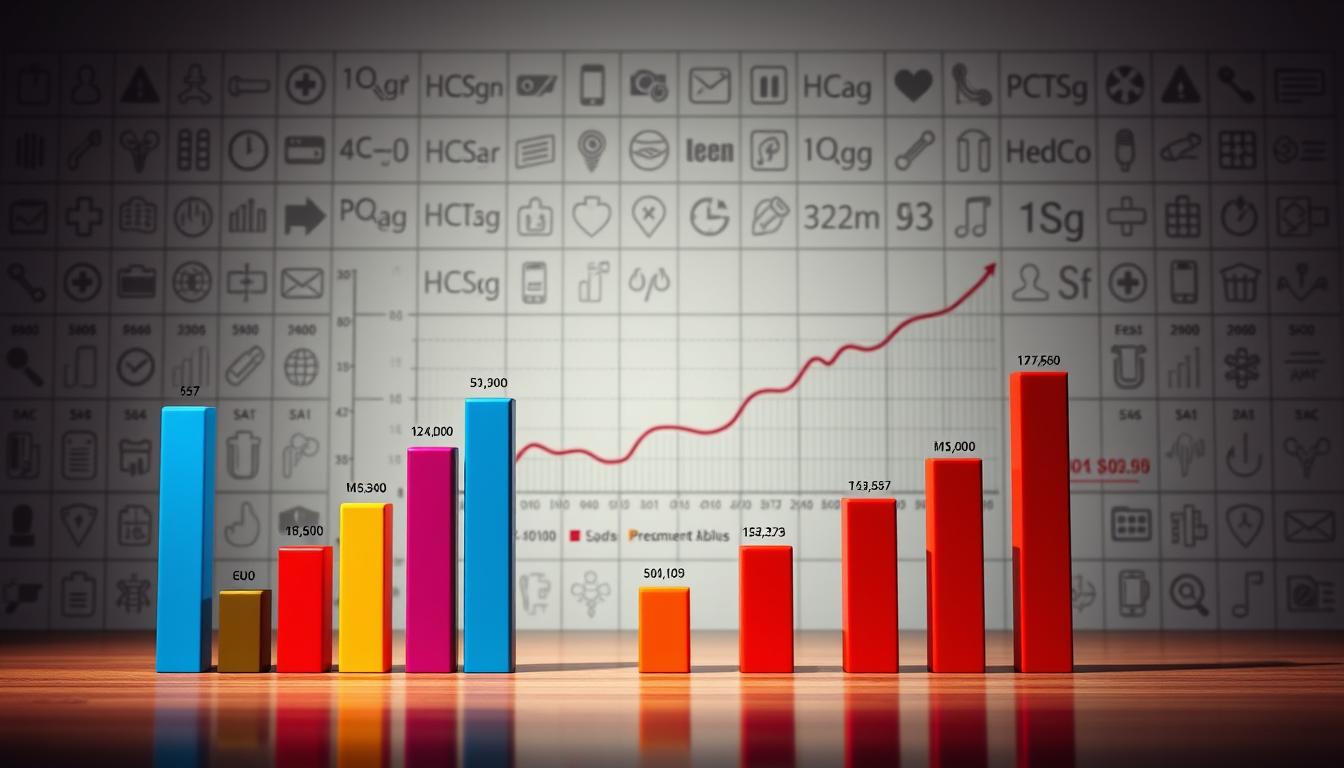
The Staggering Statistics of Hypertension Treatment
Now, 48% of U.S. adults are considered hypertensive. That’s over 120 million people. Since 2017, when the blood pressure threshold dropped, prescriptions have gone up by 35%.
Doctors now write 80 million blood pressure medication orders every year. This has made the market worth $50 billion. But, the results are not good. Only 43% of treated patients reach healthy blood pressure levels.
A recent JAMA study found that despite more medication, cardiovascular disease is still the leading cause of death.
Pharmaceutical Industry’s Role in Treatment Protocols
Drug companies spend $30 billion a year on marketing to doctors. That’s $61,000 for each doctor. They use:
- Educational “lunch and learns” to promote new drugs
- Research funding for trials focused on drugs
- Direct payments to guideline committee members
These efforts lead to 70% of initial hypertension visits ending in a prescription. Even when weight-related symptoms suggest lifestyle changes could be effective.
Insurance Incentives vs. Patient Outcomes
Healthcare rewards quick fixes over long-term solutions. A 15-minute medication check-up pays doctors 3x more than a 45-minute nutrition consult. Insurance plans usually cover:
| Covered Service | Average Cost | Patient Copay |
|---|---|---|
| Monthly Prescription | $15-$50 | $5-$25 |
| Dietitian Visit | $200 | $75+ |
| Fitness Tracker | $150 | Not Covered |
This setup makes patients dependent on stronger doses. It ignores the real causes like stress and excess weight. Until financial rewards match health goals, high blood pressure treatment will focus on pills.
How Common Blood Pressure Medications Work
Blood pressure drugs change how your body works. They can solve one problem but create another. Let’s look at three main types and their effects.

ACE Inhibitors Mechanism Explained
ACE inhibitors block an enzyme that makes angiotensin II. This compound narrows blood vessels. By stopping this, they help your arteries relax and ease heart strain. Examples include lisinopril and enalapril.
Potential dangers of hypertension drugs in this class include:
- A persistent dry cough in 20% of users
- Sudden kidney function declines
- Dangerous potassium buildup
Beta-Blockers’ Impact on Heart Function
Beta-blockers slow your heart rate by blocking adrenaline. This lowers the heart’s output. But, they can hide diabetes signs and make asthma worse.
Key changes include:
- 10-20% reduction in resting heart rate
- Decreased oxygen demand from heart muscle
- Altered stress hormone responses
Diuretics and Fluid Balance Manipulation
Diuretics, or “water pills,” make your kidneys remove more sodium and water. This lowers blood volume but messes with mineral balances. Hydrochlorothiazide is the most used.
| Class | Mechanism | Primary Action | Common Side Effects |
|---|---|---|---|
| ACE Inhibitors | Block angiotensin II production | Vasodilation | Cough, hyperkalemia |
| Beta-Blockers | Reduce adrenaline effects | Lower heart rate | Fatigue, depression |
| Diuretics | Increase sodium excretion | Reduce blood volume | Electrolyte imbalance |
Each drug class has its own dangers of hypertension drugs. Knowing these helps you see the full picture of benefits and risks.
7 Most Prescribed Hypertension Drugs Revealed
Discover the top hypertension drugs doctors prescribe most. These drugs are key in treating high blood pressure. But, each has its own side effects you should know about.
Lisinopril: The ACE Inhibitor Favorite
Lisinopril is the most prescribed ACE inhibitor, with over 21 million monthly prescriptions in the U.S. It relaxes blood vessels. But, 1 in 5 users get a dry cough, a common side effect.
Doctors like it because it’s taken once a day and helps the kidneys. Yet, 12% of patients get high potassium levels. If you feel swollen or dizzy, talk to your doctor about other options.
Metoprolol: Beta-Blocker Basics
This beta-blocker slows the heart rate by blocking adrenaline. It’s prescribed 15 million times monthly. Metoprolol is good for patients with heart issues but can make 18% feel tired.
Stopping it suddenly can cause heart rate problems. New research links it to mild memory issues. More studies are needed.
Hydrochlorothiazide: Water Pill Realities
Hydrochlorothiazide is in 40% of combo therapies. It helps with swelling by making more urine. But, it lowers potassium and magnesium in 33% of users.
Many need extra electrolytes within six months. Guidelines now suggest limiting doses to 25mg/day to avoid diabetes risks. Muscle cramps or irregular heartbeats can mean mineral imbalances.
Knowing about these drugs helps you make better choices. Next, we’ll look at hidden risks doctors might miss.
Hidden Side Effects Your Doctor Might Not Mention
Blood pressure meds can help but might cause new problems. Studies show 64% of patients face unexpected side effects within two years. These issues can quietly lower your quality of life if not talked about.
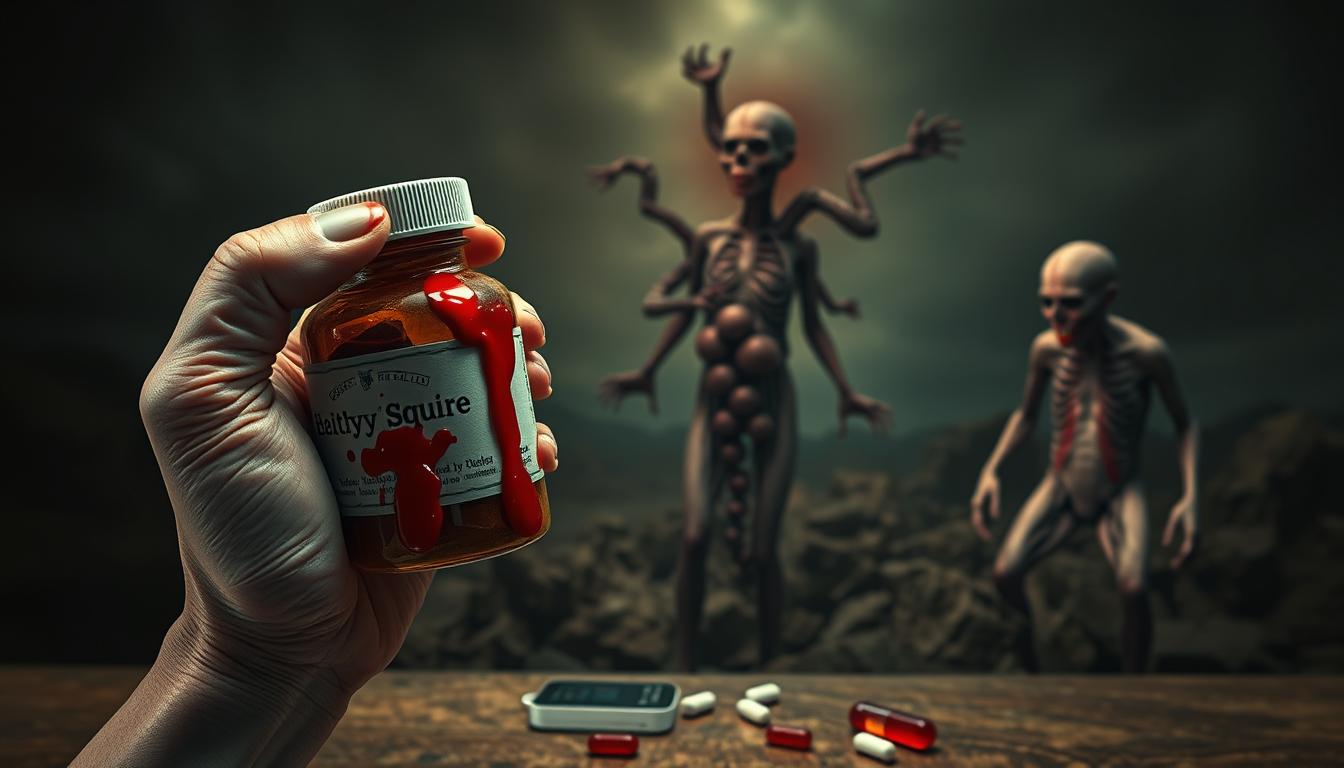
When Pills Cloud Your Thinking
Beta-blockers like metoprolol can cut brain oxygen by 18% in healthy adults, Johns Hopkins found. Patients often notice:
- Short-term memory lapses
- Difficulty concentrating
- Word-finding struggles
A 2023 Neurology study showed chronic users are 2.3x more likely to have mild cognitive impairment than those not taking meds.
| Medication Type | Cognitive Risk | Onset Timeline |
|---|---|---|
| Beta-blockers | Memory fog | 2-6 months |
| ACE inhibitors | Attention deficits | 1-3 years |
| Diuretics | Mental fatigue | Immediate |
Metabolic Mayhem From Long-Term Use
Hydrochlorothiazide raises diabetes risk by 21% over five years. It also lowers potassium, leading to:
- Raising insulin resistance
- More visceral fat
- Disrupting hunger signals
Users see 34% higher triglycerides than those controlling blood pressure with diet alone.
The Bedroom Consequences
Erectile dysfunction affects 1 in 4 men on hypertension meds. Beta-blockers cut nitric oxide by up to 40%, crucial for arousal. Women also face issues, with 19% reporting less lubrication and muted orgasms.
“Patients often hesitate to discuss sexual health, leaving these issues undiagnosed for years.”
Don’t stop your meds without talking to your doctor. Learn about personalized monitoring strategies and discuss them with your healthcare provider. Regular tests can catch problems early.
The Dangerous Cycle of Medication Dependency
Starting blood pressure medication might seem like a fix, but it can trap you in a cycle. Many patients don’t see how their pills can rewire cardiovascular function. This can lead to new issues that need even stronger treatments over time. Let’s look at three hidden ways that fuel dependency.
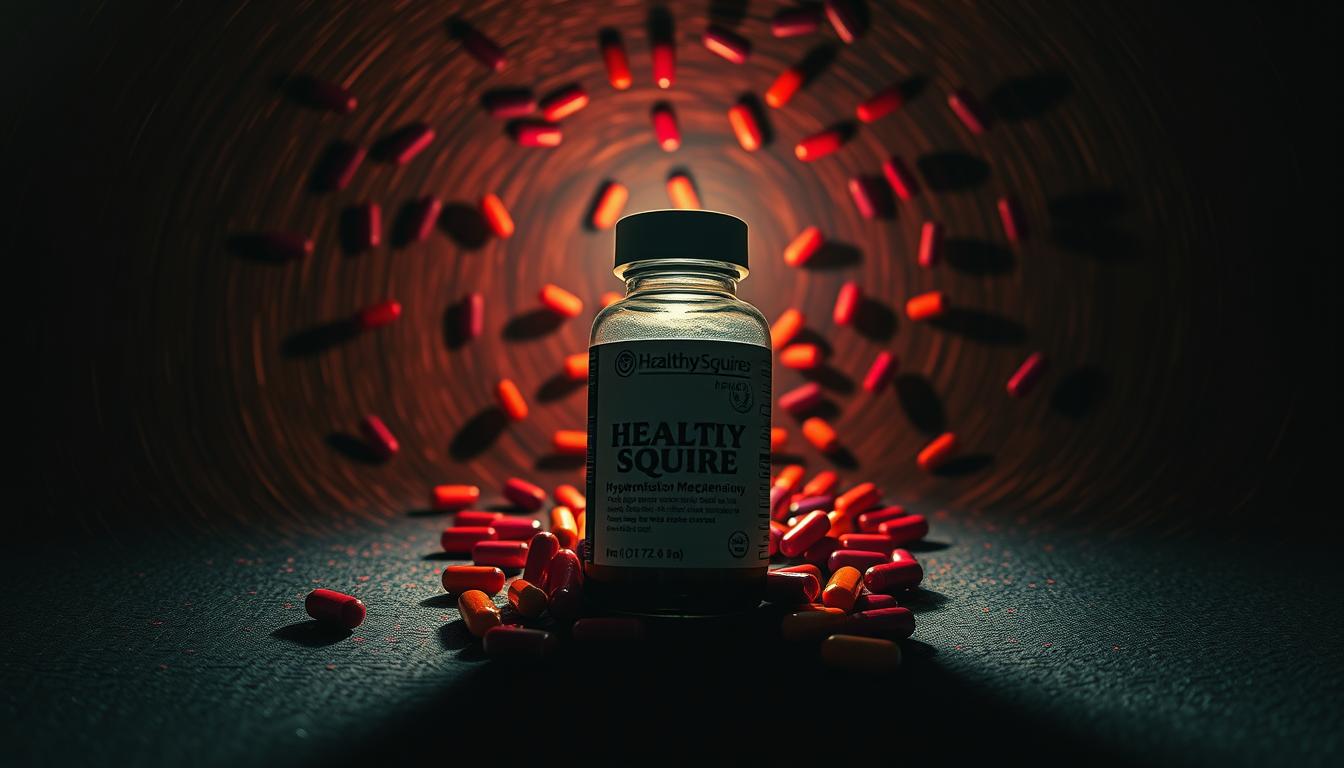
Rebound Hypertension: A Silent Boomerang Effect
Stopping blood pressure drugs too quickly can lead to dangerous spikes in blood pressure. These drugs can mess with your body’s natural ways of controlling blood pressure. When you stop, your body might overreact, causing blood pressure to rise too high.
This rebound effect can make many people go back to taking pills. Even if they wanted to stop.
The Dose Escalation Trap
Over time, your arteries can change due to medication, a process called arterial remodeling. What worked at 10mg might not work at lower doses later. Studies show 42% of patients need higher doses within five years to get the same results.
This creates a cycle where treatment becomes part of the problem.
| Risk Type | Timeline | Management Strategy |
|---|---|---|
| Rebound Hypertension | Within 72 hours of stopping | Gradual tapering under supervision |
| Dose Escalation | 6 months – 5 years | Lifestyle interventions alongside meds |
| Withdrawal Symptoms | 2-14 days post-cessation | Cardiac monitoring + nutrient support |
Withdrawal Syndrome: More Than Just Numbers
Stopping medication too quickly can cause headaches, tremors, and anxiety. These symptoms are often mistaken for other health issues. A 2023 Johns Hopkins study found 68% of patients think these symptoms mean they need medication forever.
To break free, you need to know these risks before starting treatment. Work with your doctor to plan how to stop treatment before you get stuck. Your arteries need more than just medication.
Shocking Long-Term Effects on Organ Health
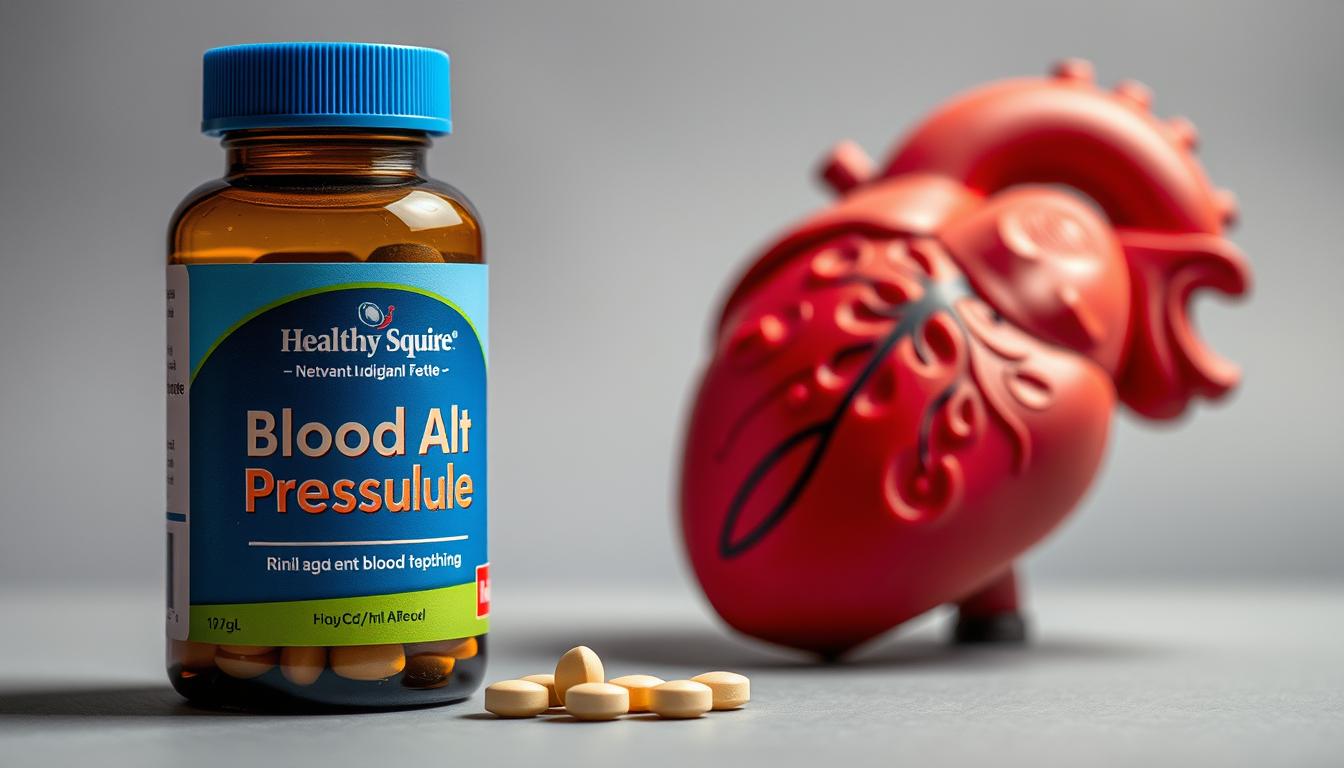
While blood pressure medications aim to protect your heart, they can have hidden dangers. These dangers can quietly damage vital organs. Sometimes, this damage is irreversible before symptoms show up.
The Kidney Damage Paradox
Diuretics like hydrochlorothiazide make your kidneys work too hard. They remove 20-30% more fluids than usual. Over time, this can:
- Reduce kidney function by up to 40%
- Make more protein leak into urine
- Raise creatinine levels, showing kidney strain
Accelerated Arterial Stiffening
Beta-blockers and calcium channel blockers can make your arteries less flexible. Research shows these drugs:
| Medication Class | Intended Benefit | Artery Impact |
|---|---|---|
| Beta-Blockers | Lower heart rate | +15% calcification rate |
| ACE Inhibitors | Relax blood vessels | -8% collagen production |
| Calcium Blockers | Reduce contraction | +22% plaque adhesion |
Liver Stress From Medication Processing
Your liver breaks down 90% of hypertension drugs. This constant work can:
- Lower glutathione levels by 35-50%
- Upset liver enzymes in 1 in 8 users
- Reduce bile production for fat digestion
Ironically, the very medications meant to protect your heart may gradually compromise multiple organ systems. Regular liver/kidney function tests become crucial for long-term users.
Nutritional Deficiencies Caused by BP Drugs
Your blood pressure medication might be quietly taking away important nutrients. These drugs help control blood pressure but can upset your body’s mineral balance. Doctors often don’t talk about this. Let’s look at three key nutrient deficiencies linked to common medications.
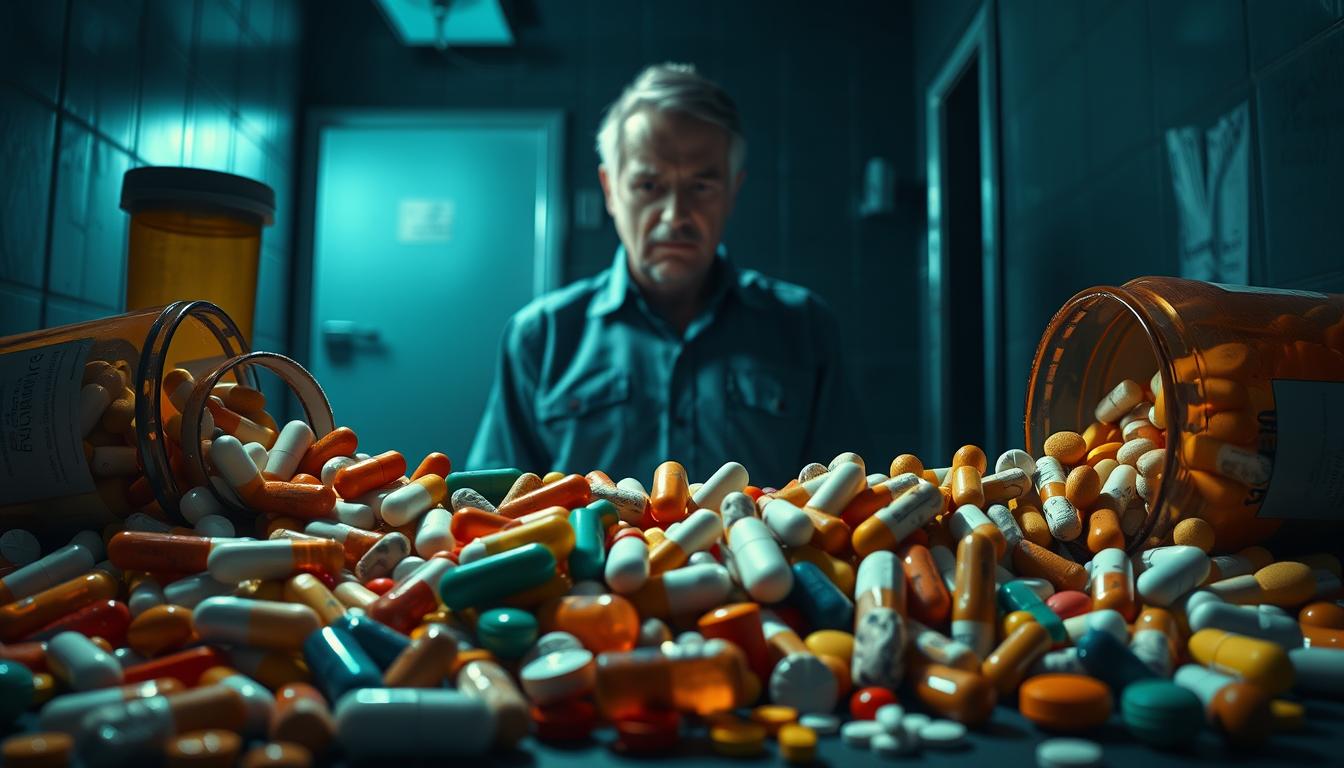
Zinc Depletion From Diuretics
Water pills like hydrochlorothiazide make your kidneys lose 20% more zinc than usual. Zinc is vital for your immune system, healing wounds, and taste. Without enough, you might get sick more often and heal slower.
CoQ10 Inhibition From Statins
Many cholesterol drugs used with BP meds block CoQ10 production. Your heart muscles need this antioxidant to work well. Without enough, you might feel weak or tired.
Magnesium Wasting Mechanisms
Some hypertension drugs make you lose magnesium in your urine. Magnesium helps control blood pressure and many other body functions. Low levels can cause muscle cramps, heart rhythm problems, and even higher blood pressure.
It’s important to watch your nutrient levels if you’re on these meds for a long time. Simple blood tests can find deficiencies early. This way, you can get the right supplements with your doctor’s help.
Natural Blood Pressure Regulation Strategies
What if you could lower your blood pressure naturally? Lifestyle changes can be as effective as some drugs, without the side effects. Let’s look at two powerful methods backed by studies.
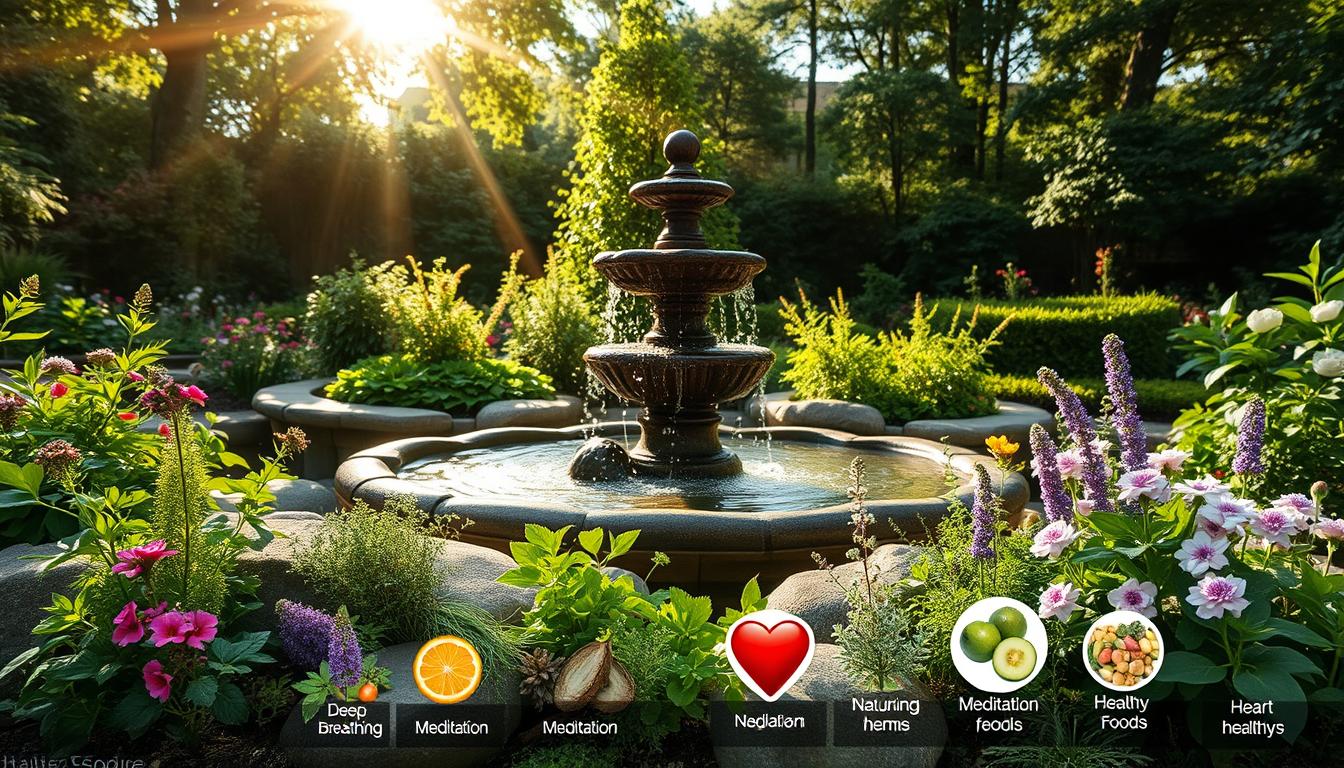
Dietary Approaches That Work
The DASH diet is a top choice for managing blood pressure. It can lower systolic pressure by 8-14 mmHg in weeks, just like some drugs. This diet focuses on:
- 4-5 daily servings of vegetables
- Fresh fruits instead of sugary snacks
- Whole grains over refined carbs
The DASH Diet Decoded
Choose foods high in potassium to balance sodium. Sweet potatoes have 3x more potassium than bananas. White beans have 1,189 mg per cup. Add low-fat yogurt for extra benefits.
Potassium-Rich Food Sources
- Spinach (839 mg per cooked cup)
- Avocado (690 mg per medium fruit)
- Salmon (534 mg per 3-oz portion)
Effective Exercise Protocols
Isometric exercises, like wall sits or grip training, can lower blood pressure by 10%. These exercises improve artery flexibility better than cardio for some.
Isometric Training Benefits
Try this simple routine:
- Grip a stress ball at 30% maximum force
- Hold for 2 minutes
- Rest 1 minute
Repeat 4 times, 3 days weekly. Studies show this lowers systolic pressure by 7-10 mmHg in a month.
Aerobic Exercise Thresholds
Aim for 150 minutes weekly of moderate activity like brisk walking. Research shows even 10 minutes a day is beneficial. Those who meet this goal see 5-8 mmHg reductions in blood pressure.
Proven Herbal Alternatives to Pharmaceuticals
Modern research is finding ancient plants that work as well as drugs. Some herbs help lower blood pressure without as many side effects. Let’s look at three natural remedies for hypertension backed by science.
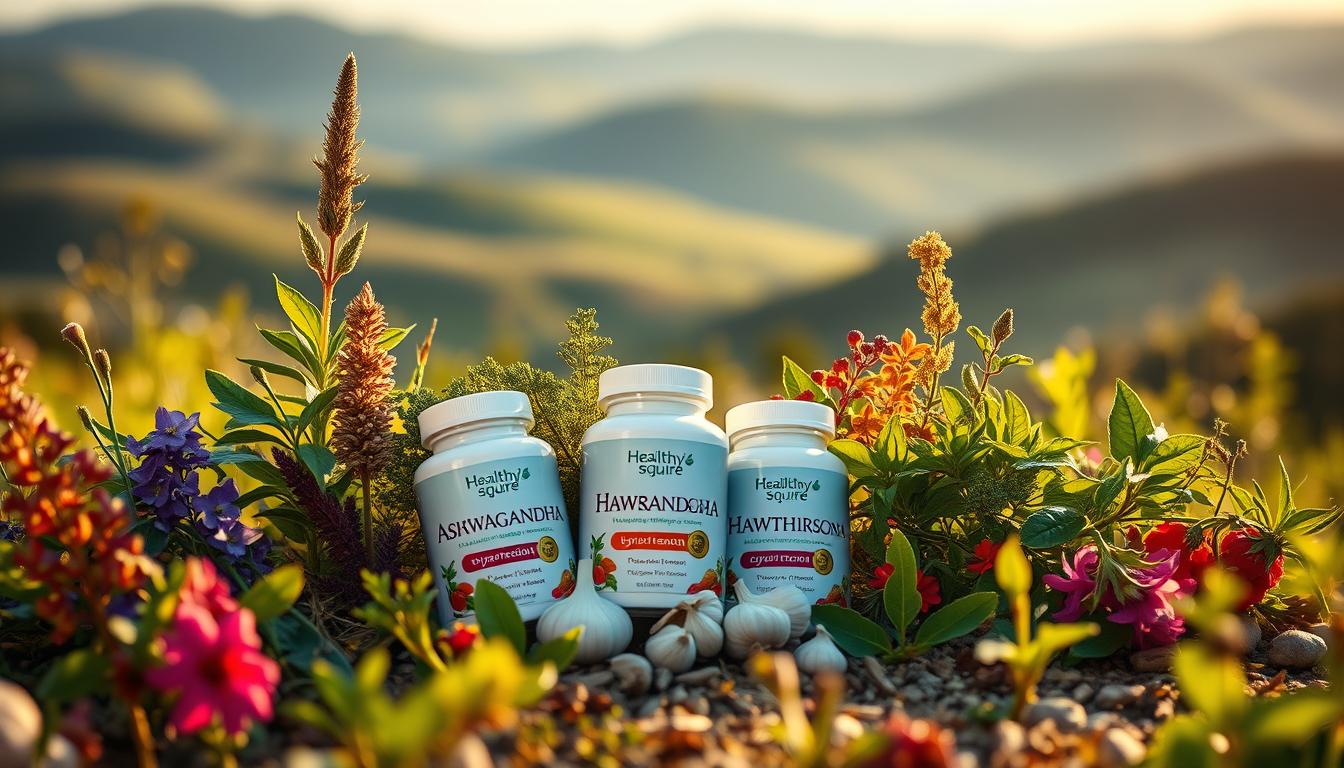
Hawthorn Berry: Nature’s Heart Tonic
Hawthorn berries have flavonoids that help blood flow and relax arteries. Studies show they can lower systolic pressure by 5-7 mmHg. This herb also helps with cholesterol and heart rhythm.
“Herbal interventions like hawthorn offer multi-target cardiovascular benefits that synthetic drugs often lack.”
Garlic’s Hidden ACE Inhibition
Raw garlic has allicin, which works like ACE inhibitors. Research shows 600-1,500 mg of aged garlic extract daily can lower blood pressure by 10-15 mmHg. Garlic also boosts the immune system with sulfur compounds.
Hibiscus Tea: The Tropical Powerhouse
Bright red hibiscus flowers have anthocyanins that relax blood vessels. A meta-analysis of 10 trials found drinking 2 cups daily:
- Reduced systolic pressure by 7.5 mmHg
- Lowered diastolic pressure by 3.5 mmHg
- Improved arterial flexibility by 18%
| Herb | Active Compound | Average Reduction | Study Duration |
|---|---|---|---|
| Hawthorn | Vitexin | 6.1/3.1 mmHg | 12 weeks |
| Garlic | Allicin | 11.2/6.5 mmHg | 24 weeks |
| Hibiscus | Anthocyanins | 7.5/3.5 mmHg | 6 weeks |
These natural remedies for hypertension work best with diet changes. Always talk to your doctor before changing your meds, especially if you’re on blood thinners or ACE inhibitors.
Lifestyle Changes That Beat Medication Results
Did you know simple daily habits can lower blood pressure more than some drugs? Studies show that non-drug strategies often work better than meds if done regularly. Let’s look at two key ways to manage high blood pressure without drugs.

Stress Reduction Techniques
Stress keeps blood pressure high by releasing cortisol. Now, biofeedback tools help you actively rewire your stress response:
HRV Biofeedback Methods
Heart Rate Variability (HRV) training devices, like HeartMath, teach stress management. These small tools connect to your phone to:
- Show your heart rhythm patterns
- Guide breathing exercises with vibrations
- Track your stress resilience progress
HRV training for 12 weeks can lower systolic BP by 9-14 mmHg, just like some meds.
Meditation Protocols
Mindfulness meditation improves blood vessel function. Try this 3-step routine:
- Sit upright for 5 minutes daily
- Focus on breath flowing through nostrils
- Label thoughts as “thinking” when distracted
This practice makes blood vessels more flexible than some ACE inhibitors.
Sleep Optimization Strategies
Poor sleep quality affects 45% of hypertension cases. Two important factors often get ignored:
Circadian Rhythm Alignment
Your blood pressure naturally drops 10-20% during sleep. Disrupted cycles prevent this drop. Fix your rhythm by:
- Getting sunlight within 30 minutes of waking
- Eating dinner before 7 PM
- Keeping bedroom temperature at 65°F
Sleep Apnea Connections
Undiagnosed sleep apnea affects 22 million Americans and triples hypertension risks. Warning signs include:
- Morning headaches
- Daytime fatigue despite “enough” sleep
- Bedpartner reports of snoring/gasping
A simple home sleep test can detect this silent BP booster.
The Weight-Blood Pressure Connection
Your waistline has a big impact on your blood pressure. Too much weight, especially around your organs, can cause problems. It leads to inflammation and stress, making your heart work harder.
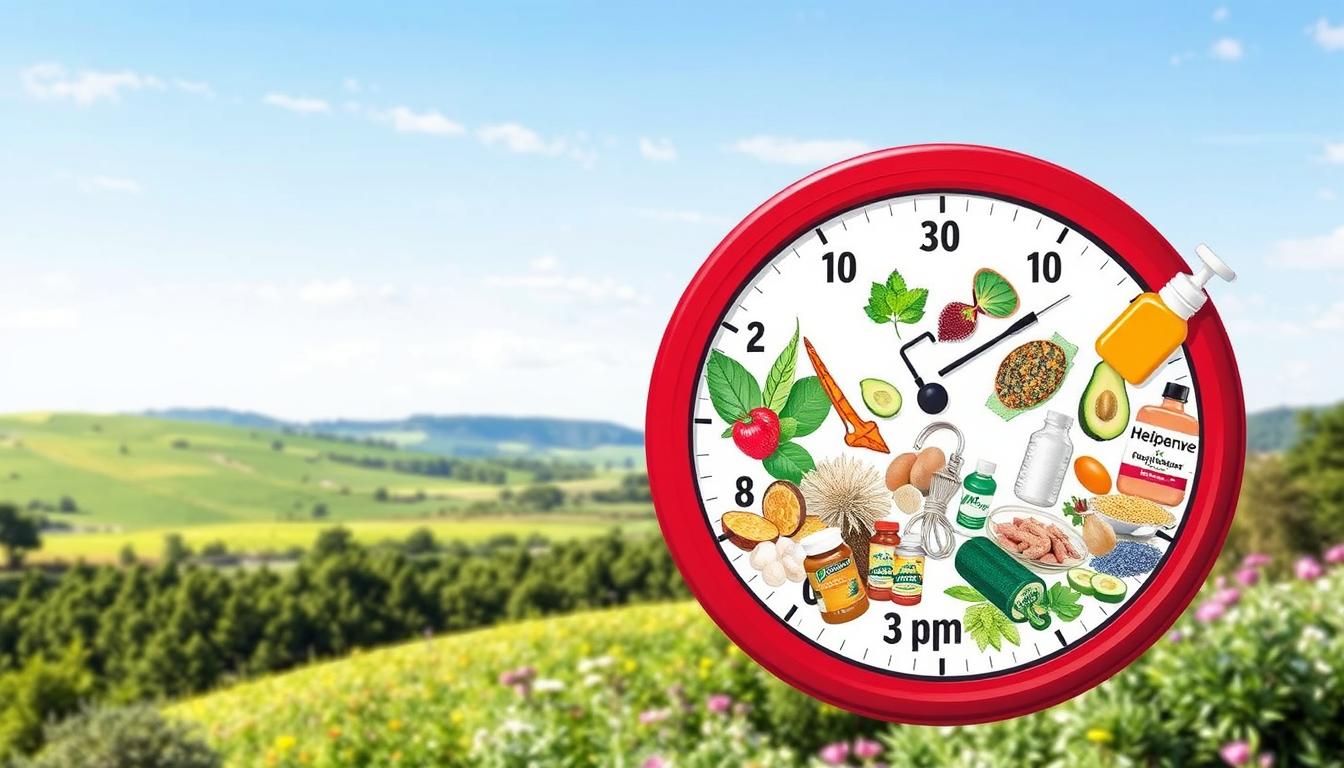
Targeting Dangerous Visceral Fat
Visceral fat is not just extra weight. It’s active tissue that affects your blood pressure. Losing 5-10% of your body weight can lower your blood pressure by 5-20 mmHg. Here’s how to track your progress:
- Waist circumference: Keep under 35″ (women) or 40″ (men)
- Waist-to-hip ratio: Aim below 0.85 (women) or 0.9 (men)
- Body fat percentage: Target under 31% (women) or 25% (men)
Timed Eating Strategies
Intermittent fasting can improve insulin sensitivity, which helps with blood pressure. These methods can lower systolic BP by 6-11 mmHg:
| Method | Fasting Window | BP Impact |
|---|---|---|
| 16:8 | 16-hour fast daily | -8 mmHg average |
| 5:2 | 2 days/week (500 cals) | -11 mmHg |
| Alternate Day | 24-hour fasts | -9 mmHg |
Food as Medicine
An anti-inflammatory diet can help with high blood pressure. Eat these foods to support your health:
- Leafy greens: High in blood vessel-relaxing nitrates
- Wild-caught fish: Omega-3s reduce arterial stiffness
- Berries: Anthocyanins protect endothelial function
Reduce processed foods and added sugars to lower inflammation. This can cut inflammation markers by 30% in three weeks. Combine this with regular exercise for the best results.
Debunking Blood Pressure Medication Myths
Let’s tackle three myths that keep millions on unnecessary meds. Doctors often give drugs as the first high blood pressure treatment. But old beliefs about these treatments might be bad for your health.
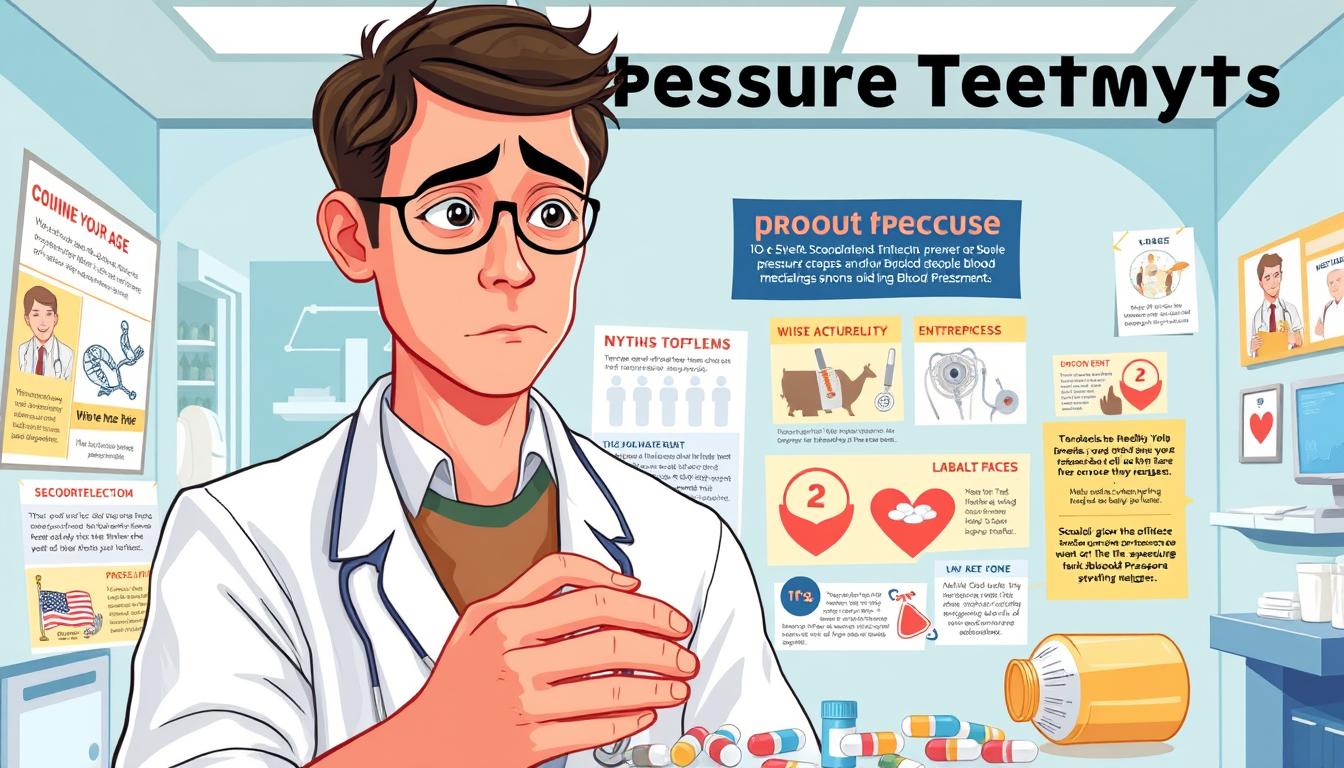
The “Forever Prescription” Fiction
Many think they’ll always need meds like lisinopril or metoprolol. But new guidelines from the American Heart Association say 40% of users might not need as much. This is if they make lifestyle changes.
“Medication withdrawal under supervision can be safe when paired with proven non-drug therapies,”
their 2023 paper states.
Redefining “Normal” Ranges
The debate on blood pressure targets is ongoing:
- 130/80 mmHg: Current AHA recommended threshold
- 140/90 mmHg: Older standard still used by some insurers
- 120/80 mmHg: Optimal vascular health marker
This confusion can lead to too much treatment. Your best numbers depend on your age, health, and risk factors. It’s not just about what the books say.
Age Isn’t a Free Pass
While arteries get stiffer with age, recent studies show:
- 70-year-olds can hit 120s/70s with diet changes
- Medication can make aging worse
- Healthy living works at any age
Your age doesn’t mean you have to keep taking more meds. A mix of exercise, stress control, and good nutrition often beats pills. It doesn’t matter how old you are.
When Medication Becomes Absolutely Necessary
While making lifestyle changes can help with blood pressure, some situations need medicine right away. Knowing when to seek medical help can save your life or prevent serious harm.
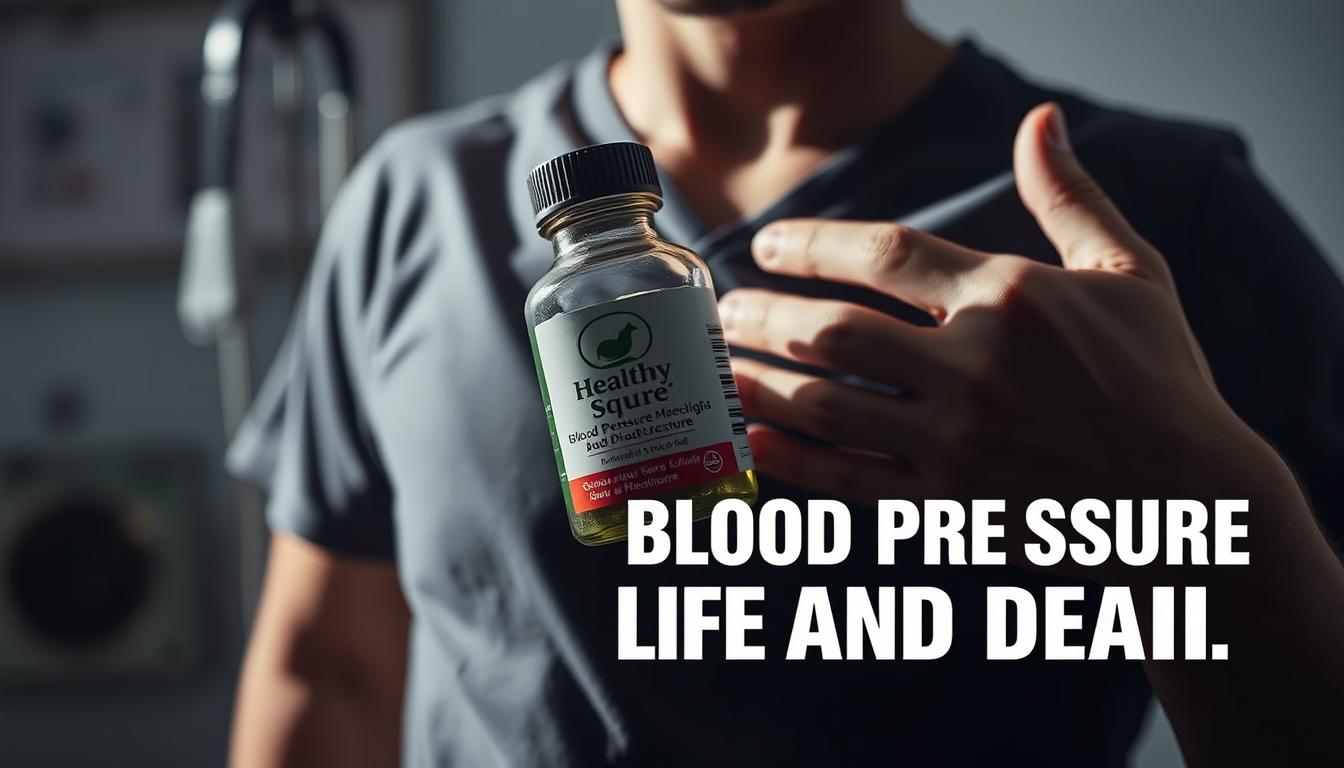
Hypertensive Crisis Thresholds
Readings above 180/120 mmHg mean you need urgent care. At this level, your blood vessels face extreme pressure. This can lead to:
- Stroke
- Heart attack
- Kidney failure
“Patients with sustained BP ≥180/120 need rapid-acting medications to prevent target organ damage.”
Organ Damage Warning Signs
Look out for signs that you need medicine fast:
- Blurred vision or sudden headaches (brain stress)
- Chest tightness with irregular pulse (heart strain)
- Foamy urine or reduced urination (kidney injury)
These signs mean your body is failing. Waiting to get help can cause permanent damage.
Genetic Predisposition Realities
For 15% of people, high blood pressure comes from their genes. Conditions like familial hyperaldosteronism can’t be fixed by just changing your lifestyle. Tests can show:
- Abnormal sodium retention
- Excess aldosterone production
- Adrenal gland mutations
In these cases, specific blood pressure medicine is key. It works with diet changes to keep your heart safe.
How to Safely Reduce Medication Dependence
Controlling your blood pressure doesn’t mean stopping all medications at once. With the right plan and doctor’s advice, you can slowly take back your health. This way, you can lower your need for prescriptions safely.
Why Medical Supervision Matters
Never try to change your doses by yourself. Your doctor will look at your current health, organ function, and lifestyle before making changes. Regular visits help spot any early signs of trouble, like unstable blood pressure or heart rhythm issues.
The Step-Down Strategy That Works
Studies show that reducing doses by 10% every 3 weeks is a good balance. For example:
- Week 1-3: Cut 5mg from a 50mg daily dose
- Week 4-6: Reduce another 5mg if readings stay stable
- Week 7-9: Introduce natural supports like magnesium supplements
Smart Monitoring Habits
Get a reliable home blood pressure cuff and track your readings twice a week. Always log:
- Exact time of measurement
- Recent physical activity
- Stress levels
- Medication timing
Share this data with your doctor at checkups. Watch for signs like dizziness, fatigue, or headaches. These could mean you’re reducing doses too fast. Pair tapering with healthy lifestyle changes, like eating less sodium, to keep progress steady.
Success Stories: Breaking Free From Pills
Imagine taking back control of your health without daily pills. These inspiring tales show alternative options for high blood pressure can lead to remarkable changes. They happen when you’re dedicated and get the right medical advice.
From Three Pills to Zero in 14 Months
Mike, a 58-year-old accountant, cut his systolic pressure by 28 points. He used the DASH diet and brisk walking. His doctor-approved plan got rid of all his meds through:
- Daily 45-minute walks
- Reduced sodium intake (under 1,500mg)
- Stress management with guided meditation
Reversing Postmenopausal Hypertension
Sarah, 63, lowered her diastolic pressure 15 points with resistance training and hibiscus tea. “I thought menopause doomed me to lifelong pills,” she says. “Now I’m medication-free and more energetic than at 50.”
NIH-Backed Lifestyle Transformation
A clinical trial showed 34% of participants needed less medication with lifestyle changes. Key strategies included:
- Gradual weight loss (5-7% body weight)
- Targeted potassium-rich foods
- Alcohol reduction to 1 drink daily
These stories prove personalized approaches to blood pressure management can be more effective than standard treatments. While results differ, each tale highlights the power of combining medical guidance with alternative options for high blood pressure.
Conclusion: Taking Control of Your Cardiovascular Health
Learning about blood pressure medications can help you make better health choices. While drugs like lisinopril and metoprolol are crucial in emergencies, long-term health needs lifestyle changes. Studies from USC’s Keck School of Medicine show that combining diet changes with doctor advice can cut down on medication needs in months.
Begin by talking to your doctor about other options. Dr. Rajesh Garg’s clinic at USC focuses on plans that tackle the real causes of high blood pressure, like inflammation and insulin resistance. Simple steps, like eating more potassium-rich foods or walking daily, can greatly improve heart health.
Use home blood pressure monitors, as suggested by the American Heart Association, to track your progress. Many people see a 5-10 mmHg drop in blood pressure by managing stress with techniques like box breathing or meditation. These methods can work alongside medication, reducing side effects mentioned earlier.
Real-life examples show that lasting changes are possible. At Cleveland Clinic’s Wellness Institute, patients often stop taking medication through a program that includes hibiscus tea and exercise. Your journey to better heart health starts with learning and exploring natural ways to stay healthy, while keeping in touch with your healthcare team.